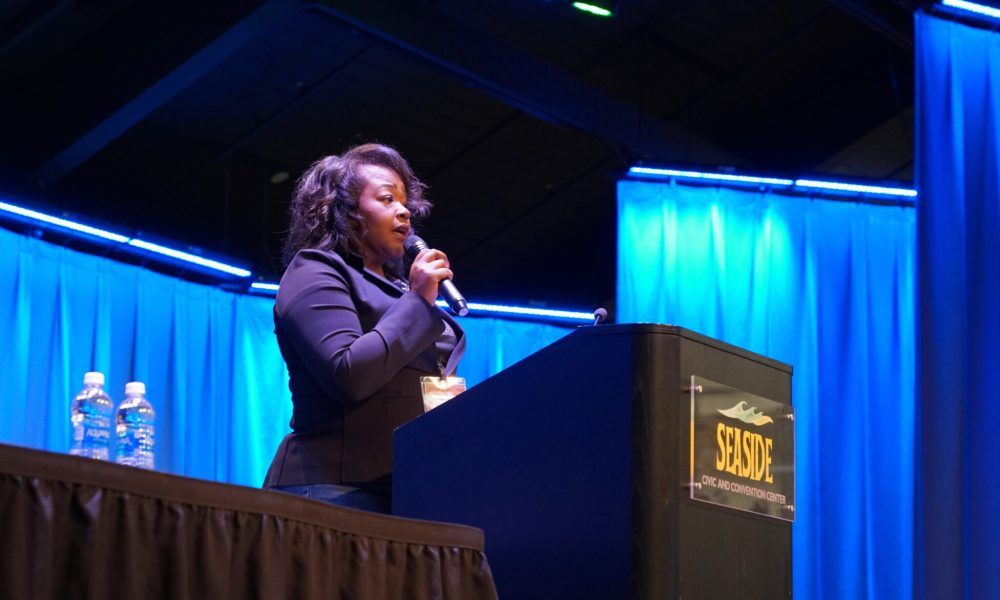Ebony Clarke, Oregon’s new behavioral health director, urged a packed conference in Seaside to look beyond state government for solutions and change.
Clarke, appointed by Gov. Tina Kotek in February, spoke Monday at Peerpocalypse, a gathering of people who work in peer support roles. Peer workers use their life experiences to help people who need help, including with addiction and mental health problems. The four-day event, organized by the Portland nonprofit Mental Health & Addiction Association of Oregon, has grown in the past decade from less than 100 people in 2013 to more than 1,000 in attendance on Monday – more than 800 of them in person and several hundred virtually. It coincides with a behavioral health crisis in the state, fueled by a flood of illicit meth and fentanyl on the streets.
Taking office, Kotek pledged to address the crisis by increasing funding for behavioral health and homelessness. Clarke said the community also needs to help.
“It’s not just about saying, ‘Okay, I need the county to do this. I need the state to do this,’” Clarke said. “It’s a collective approach, and this is an issue that we cannot do unless we all put our pieces of the puzzle together.”
Like peer workers who use their experiences to coach clients, Clarke has a compelling life story. She was born premature in Portland, and her mother used narcotics throughout the pregnancy. Clarke had opioids in her blood when she was born and spent part of her early childhood being transferred to foster parents, relatives and hospitals before she was reunited with her mother at a residential treatment center.
“I was born with heroin in my system,” Clarke said. “My mom was a heroin addict.”
Clarke said she wants those who need help to have a voice as the state works on behavioral health policies.
“My commitment is to make sure that from the inception of strategy, from the inception of policy, that you are at the table and walking alongside us,” Clarke said.
Before moving to the Oregon Health Authority, Clarke was director for the Multnomah County Health Department after serving as the county’s behavioral health director.
She urged the group to hold her and the state accountable and pledged to work hard for an inclusive system that keeps equity at the forefront.
Clarke drew applause when she said: “I made an active decision to not sit on the sidelines and bitch about the state.”
She added: “I made a decision to step up, roll up my sleeves and be a part of the solution. So I’m not going to sit on the sidelines and eat my popcorn and wait for our system to fail.”
Oregon’s behavioral health system has failed for years, earning the state consistently low rankings in national surveys. In its 2023 statewide report, Mental Health America rates Oregon as having the highest incidence of mental health per capita. Over the past two years, the Legislature has allocated more than $1 billion for behavioral health services but the Oregon Health Authority has been slow to distribute the money.
In an interview with the Capital Chronicle, Clarke said the drug epidemic needs to be addressed head-on.
“We need to find some real solutions to getting folks to step into places to start to get the treatment, walk folks through treatment, and then hopefully sustain their recovery,” Clarke said.
That’s something that Janie Gullickson, the executive director of the Mental Health & Addiction Association of Oregon, knows about. She was addicted to meth and alcohol for two decades until she got help with a six-month treatment program.
“Recovery looks different for everyone,” Gullickson said. “To have someone without an agenda without an ulterior motive, but just from having been there, done that, and share that connection and work shoulder to shoulder helps.”
Others also were enthusiastic about Clarke and said they hope they’ll have a strong voice when the state crafts behavioral health policies.
“It’s about time,” said Tonya Jones, the association’s deputy director of operations. “I believe in Ebony. Ebony will do exactly what she said up there.”
Oregon Capital Chronicle is part of States Newsroom, a network of news bureaus supported by grants and a coalition of donors as a 501c(3) public charity. Oregon Capital Chronicle maintains editorial independence. Contact Editor Lynne Terry for questions: [email protected]. Follow Oregon Capital Chronicle on Facebook and Twitter.
STORY TIP OR IDEA? Send an email to Salem Reporter’s news team: [email protected].

Ben Botkin - Oregon Capital Chronicle
Ben Botkin covers justice, health and social services issues for the Oregon Capital Chronicle. He has been a reporter since 2003, when he drove from his Midwest locale to Idaho for his first journalism job. He has written extensively about politics and state agencies in Idaho, Nevada and Oregon. Most recently, he covered health care and the Oregon Legislature for The Lund Report. Botkin has won multiple journalism awards for his investigative and enterprise reporting, including on education, state budgets and criminal justice.









